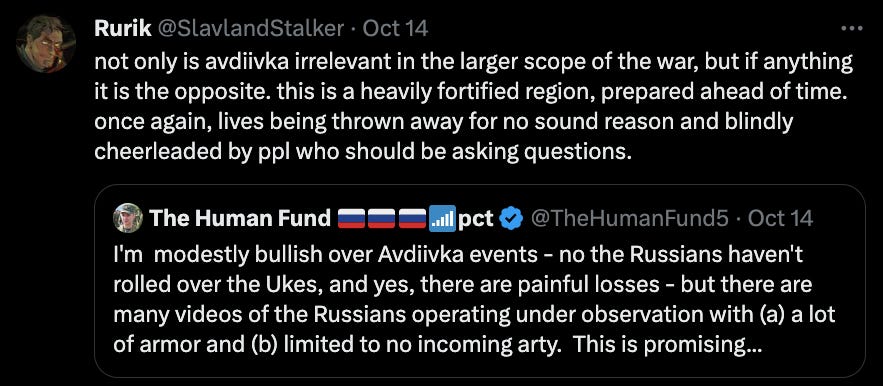Will the Gaza War Threaten Jewish Power in the U.S. and Their Status as Occupying the Moral High Ground?
Jewish Power in the U.S. Is on Full Display
The Gaza war is bringing us an awesome display of Jewish power over the US media and political culture. It’s a display that could effectively wake Americans up to how deeply entrenched Jews are in the American power structure. Even the mainstream media is featuring images of Gazan suffering, bloodied children, and the over 10000 Gazan deaths, mostly women and children. Even clueless White liberals must be starting to wake up about Israel, but of course they will turn a blind eye to the Jewish power in America as enabling all of this, such as that they’re basically funding the Democratic party and its woke agenda; the party that preaches a utopian vision of ethnic harmony as a moral imperative supporting yet another round of the decades-long destruction and ethnic violence against the Palestinians.
The Biden administration seems to be realizing that their blind support for Israeli violence can’t be sold to their voters and are pleading with the Israelis for humanitarian pauses. To no avail. As always, “America’s greatest ally” thumbs its nose at America when it wishes. And why not? Just one example: America has been vainly pleading with Israel to stop the West Bank settlements for over 50 years. To no effect. And right now the settlers are violently attacking the West Bank Palestinians. The money and diplomatic support just keep coming. Today’s New York Times:
There is a long history of U.S. presidents realizing they don’t have as much leverage over Israel as they thought,” said Representative Seth Moulton, a Massachusetts Democrat and former Marine who served four tours in Iraq. And he said the same applies to Ukraine, “where this is first and foremost their fight, even if we have huge stakes in the outcome.
The atmosphere in Jewish circles right now can best be described as “Blood lust. Kill all the Palestinians, or at least the Gazans. There is no context in the messages emanating from the high ground of American culture—little or no mention of the decades-long occupation, the ethnic cleansing and apartheid, or the open-air prison status of Gaza and the 17-year blockade. And it’s obvious that Jewish media influence is critical for this.
However, as always, the ultimate cause of Jewish power is simply money — most obviously funding a powerful infrastructure of influence, organizations like the ADL. AIPAC, JINSA, left-leaning and war-mongering lobbying groups like WINEP — the sorts of organizations that ambitious (and sociopathic) politicians necessarily pay attention to. Jewish financial clout is thus on full display, e.g., punishing the universities and pro-Hamas protesters for allowing anti-Israel speech (= anti-Semitism if you haven’t noticed). Pro-Hamas students and protesters at Ivy League universities have been doxxed and blacklisted from jobs they had been offered at prestigious law firms.
Billionaire Bill Ackman demanded a blacklist of students who’d been protesting Israel, so he and others would not inadvertently hire them in the future. A mobile placard went around Harvard Square with the names of students who’d backed the Palestinians even as Hamas’ atrocities were unfolding. “We need to make sure these students pay a price and that their neighbors, friends, and employers know that they harbor these beliefs,” explained one CEO. He repeated his accusations in an November 4 tweet directed at Harvard’s affirmative action president Claudine Gay:
“Jewish students are being bullied, physically intimidated, spat on, and in several widely-disseminated videos of one such incident, physically assaulted. Student Slack message boards are replete with antisemitic statements, memes, and images,” Ackman wrote.
Ackman, 57, also noted that students on campus have been calling for “violent insurrection” and “use eliminationist language seeking the destruction of the State of Israel and the Jewish people.”
Assuming this is true, Jews are definitely on the defensive in universities. But the message is clear. Ambitious students would be well advised to forget their principles and go with the Jewish perspective on the war. And of course, it’s not just Ackman: Alan Dershowitz, Leslie Wexner, Marc Rowan, Richard Wolf, David Magerman, Steven Solomon, Clifford Asness, Leon Cooperman, Steve Eisman — wealthy and powerful people all. Rowan’s activism threatens to blow a billion-dollar hole in the budget of the University of Pennsylvania and the jobs of the university president and head of the Board of Trustees are on the line.
As always, Jews, as an elite, aim their activism at influencing the most powerful, prestigious institutions in society. Jewish influence is always top-down—control the high points of the media, academic, and political pyramid of power, and the rest will conform or at least be manageable. And to further emphasize the point, Ackman’s activism was followed up by 27 prestigious law firms sending letters to the law schools of prestigious universities.
Over the last several weeks, we have been alarmed at reports of anti-Semitic harassment, vandalism and assaults on college campuses, including rallies calling for the death of Jews and the elimination of the State of Israel. Such anti-Semitic activities would not be tolerated at any of our firms. We also would not tolerate outside groups engaging in acts of harassment and threats of violence, as has also been occurring on many of your campuses.
A Reuters article noted:
A Sullivan & Cromwell spokesperson said on Thursday that senior chair Joseph Shenker spearheaded the letter to the law schools known in the legal industry as the “T-14,” as ranked by U.S. News & World Report. Other signatories include some on the nation’s biggest and most profitable law firms, including Cravath, Swaine & Moore; Latham & Watkins; Skadden, Arps, Slate, Meagher & Flom; and Paul, Weiss, Rifkind, Wharton & Garrison.
The Jewish editor of eLife, an online journal for the life sciences was fired for retweeting an Onion article that called out indifference to the lives of Palestinian civilians” with the title “‘The Onion’ Stands With Israel Because It Seems Like You Get In Less Trouble For That.” Great title and obviously true. The article talks about the likely costs of any criticism of Israel, including being blacklisted from their jobs. The article way too close to home for the powers that be.
We think of the left as the main perpetrators of cancel culture but the mainstream right, which is all in for Israel, has the same tendencies despite having less power. But here’s Republican Senator Tom Cotton, in a letter to the evil DHS secretary Majorkas, this week:
I write to urge you to immediately deport any foreign national — including and especially any alien on a student visa — that has expressed support for Hamas and its murderous attacks on Israel. These fifth-columnists have no place in the United States. Swiftly removing and permanently barring from future reentry any foreign student who signed onto or shared approvingly the anti-Semitic letter from the Harvard Palestine Solidarity Committee on October 7 would be a good place to start.
But Glenn Beck takes first prize as the most subservient, clueless conservative:
Beck, a devout Christian, said on his show that he wants to do more than simply offer words of support for the country.
He is asking for citizenship, he said, so that he might offer “deeds” for the Jewish people, rather than simple words.
“I don’t know why I was born, but there is something about the state of Israel that connects deeply to me,” Beck told his listeners.
He added, “To have the privilege to stand with the Jew is a tremendous honor, spiritually. So, I want to read a letter that I wrote that I am sending to the state of Israel.”
Beck then recited the letter, which said: “To Prime Minister Benjamin Netanyahu and the honorable officials at the state of Israel. In this moment, I have chosen to ask you for citizenship in the state of Israel.
Republicans are reliably worse on Israel than the Democrats who likely have a more difficult time reconciling Israel’s behavior with their virtue-signaling about ethnic hatred. Like at the recent Republican Jewish Coalition convention in Las Vegas. Nikki Haley was the star, and has the support of the neocons who deserted Trump in 2016 but managed to dominate foreign policy in the Biden administration. Ramaswamy was the villain, and with the Never-Trumpers in the driver’s seat:
Trump is too much of an isolationist for these people, and he criticized Netanyahu and called Hezbollah, the Lebanese militant group, “very smart.” …
“I will not criticize Israel’s prime minister in the middle of a tragedy and war,” Haley added as Israel expanded its ground offensive in Gaza, with Netanyahu warning of a long and difficult war after Hamas’ attack on Oct. 7.
Ramaswamy expressed support for Israel’s right to dismiss the “myth” of a two-state solution—at least he acknowledges it’s a myth, but it wasn’t enough. After all, he had the temerity to say in an interview with Tucker Carlson that U.S. interests must come first, even with Israel. Ramaswamy argued the U.S. needs to remember the mistakes of the recent past, like getting into trillions of dollars of debt for two failed wars in Afghanistan and Iraq—wars that were not well-planned and had no clear objective. Unacceptable! War is good!
Ep. 29 After the Hamas attacks, what’s the wise path forward? pic.twitter.com/AwWkcLFUBb
— Tucker Carlson (@TuckerCarlson) October 9, 2023
DeSantis, who held his first cabinet meeting as governor in Florida in Jerusalem, referred to the West Bank as “the most ancient Jewish land going back to biblical times—apparently giving a green light for ethnic cleansing. Sen. Tim Scott of Florida reiterated his calls to deport foreign students participating in “antisemitic” protests on college campuses. Basically, the Republicans are hopeless as they are about pretty much everything.
Incidentally, Nikki Haley is bought and paid for:
When Haley last served in office as the U.S. ambassador to the United Nations, her family’s finances were a mess. Her parents owed over $1 million and were in danger of losing their Lexington, South Carolina home. A devoted daughter, Haley had loaned them hundreds of thousands of dollars in the past with her husband. But she could not solve all of her parents’ problems, with less than $100,000 sitting in her bank accounts and $185,000 coming in each year in salary.
Since then, Haley’s net worth has ballooned from less than $1 million to an estimated $8 million. How did she make so much money in so little time? By following a tried-and-true playbook for politicians looking to cash in on their fame. Speeches to companies like Barclays and organizations such as the Centre for Israel and Jewish Affairs provided more money in a day than Haley had previously earned in a year. It’s not clear how many talks she gave from 2019 to 2021, but Haley hauled in $2.3 million from just 11 events in 2022.
Jewish Revenge
In a speech to IDF soldiers, Netanyahu framed the invasion in biblical terms, declaring that “You must remember what Amalek has done to you, says our Holy Bible”
“Now go and smite Amalek, and utterly destroy all that they have, and spare them not; but slay both man and woman, infant and suckling, ox and sheep, camel and ass” (1 Samuel 15:3)
Netanyahu declaring invasion: “You must remember what Amalek has done to you, says our Holy Bible”
1 Samuel 15:3
“Now go and smite Amalek, and utterly destroy all that they have, and spare them not; but slay both man and woman, infant and suckling, ox and sheep, camel and ass” pic.twitter.com/5QF9PkGhjJ
— Michael Tracey (@mtracey) October 28, 2023
And that is exactly what they are doing. The repeated bombing of a refugee camp in Gaza with many casualties, not to mention hospitals, seems to have had an impact on even the US media. In the case of the refugee camp, hundreds of civilians have died for supposedly killing two top Hamas leaders. No one seriously believes that Israel is trying to spare civilians.
Jews have a long memory and a powerful sense of vengeance against those they see as their enemies. The problem is that ultimately Jews see us as deadly enemies. For serious Jews, their history in the West is little more than a long series of disasters—the destruction of the Second Temple by the Romans, medieval expulsions and pogroms, nineteenth-century pogroms in Russia, the 1924 U.S. immigration law and quotas at Ivy League universities, and ultimately the holocaust. The transformation of the U.S. into a multiethnic, multicultural cauldron and an impending White minority should make White Americans realize that ultimately Jews will turn on them when they have enough power, as they achieved in the Soviet Union after the Bolshevik Revolution.
Jews and the Moral High Ground
Perhaps the greatest strength that Jews have is that since World War II they have occupied the moral high ground. The Western media has been deluged with messages of Jews as victims of irrational anti-Semitism. This message has been blasted by the mainstream media for decades and it is an integral aspect of academic culture where Jewish power and influence greatly expanded, especially during the 1960s. Of course, we as White Americans have very good reasons to oppose Jewish influence, particularly their influence in promoting the transformational changes resulting from massive non-White immigration which has already weakened the power of White Americans. It’s no accident that the present Secretary of Homeland Security is a Jew who has imported around 4–8 million illegal aliens who will eventually vote, along with their children.
But non-White immigration is presented as a moral imperative in the media and you’re an evil Nazi if you oppose it. The fact is that Jewish efforts to alter the ethnic balance of the U.S. reflect Jewish hatred for the traditional West because of anti-Jewish movements in the past reaching back to the Roman Empire, and in particular many Jewish activists explicitly seek to prevent the sort of mass movement that occurred in Germany in the 1930s. There are many such statements by Jewish activists, some quoted in the chapter on immigration in The Culture of Critique, but the most recent one I have found is from Boston Globe writer S. I. Rosenbaum writing in a very mainstream outlet, The Boston Globe, who claimed in 2019 that the main lesson of the Holocaust is “that white supremacy could turn on us at any moment,” and that the strategy of appealing to the White majority “has never worked for us. It didn’t protect us in Spain, or England, or France, or Germany. There’s no reason to think it will work now.” So you can see this hatred against the West on full display. The central question of Jewish political engagement in Western societies, she insisted, is “how we survive as a minority population,” where the one great advantage American Jewry enjoys is that “unlike other places where ethno-nationalism has flourished, the U.S. is fast approaching a plurality of minorities.” Presiding over a coalition of non-White groups to actively oppose White interests is the new Jewish ethno-political imperative: “If Jews are going to survive in the future, we will have to stand with people of color for our mutual benefit.”
It’s the same in the U.K.: Tobias Langdon quotes Barbara Roche, immigration minister in the disastrous Tony Blair government:
“Friday rush hour. Euston station [in London]. Who’s here? Who isn’t. A kaleidoscope of skin colours. The world in one terminus. Barbara Roche can see it over the rim of her cup of Americano coffee. “I love the diversity of London,” she tells me. “I just feel comfortable.” (Hideously Diverse Britain: The immigration ‘conspiracy’, The Guardian, 2nd March 2011)
Roche wasn’t acting on her own when she became immigration minister and opened Britain’s borders to Somalis and other low-IQ, high-criminality Third-Worlders. She was collaborating with other Jews to make Britain a more “comfortable” place for Jews. And since she left office, she has continued to campaign for open borders and for more anti-White bureaucracy:
Tony Blair should promote the benefits of legal immigration to Britain, and “not back off” from plans to create a super equalities commission, Barbara Roche, the former equalities minister, has urged. … The child of a Polish-Russian Ashkenazi father and a Sephardic Spanish-Portuguese mother, Ms Roche has reason for her feelings on immigration. “My being Jewish informs me totally, informs my politics. I understand the otherness of ethnic groups. The Americans are ahead of us on things like multiple identity. I’m Jewish but I’m also a Londoner; I’m English but also British.” (Roche urges Labour to promote the benefits of legal migration, The Independent, 24th June 2003)
In fact, Barbara Roche is neither English nor British. How could she be, when “being Jewish informs [her] totally”? For her and for other powerful Jews in the West, a term like “British” or “French” or “American” is merely geographic. That’s why she was so eager to flood Britain with low-IQ Third-Worlders, re-shaping its demographics in a way that, while inflicting huge harm and expense on native British Whites, allowed her to “feel comfortable” while sipping “her cup of Americano coffee” at Euston station
In their 2023 book Anglophobia Harry Richardson and Frank Salter note that Jewish organizations have taken a leadership role in promoting multiculturalism and immigration in Australia, for example by making alliances with more poorly organized, less motivated ethnic groups. This leadership phenomenon also occurs in the US, where Jewish organizations have made alliances with a wide variety of non-White ethnic activist organizations.
But this mass migration into Western societies presents some problems for Jews, particularly immigration from Muslim countries. Since the Gaza invasion there have been huge protests in Western countries against Israel’s treatment of the Palestinians, with a highly visible representation of Muslims. I have always thought that Jewish activists, like Steven Steinlight, have known that such immigration would have some downsides for Jews, but that the Jewish establishment feel it is manageable, and so far, they certainly have been correct. In general Muslims throughout the West have voted for the left along with the Jews. However, because of Biden’s support for pretty much anything Israel does, such as making the outrageous claim that “We’re certain Israel is doing its best to avoid civilian casualties” and opposing a ceasefire, this may change. And Jews may want to rethink their support for Muslim immigration if things continue in this direction.
But at present Jews retain their victim status in the media. Holding the moral high ground is especially important in Western individualist societies. Unlike the rest of the world where kinship relations and extended family are paramount, the social glue of Western societies is reputation in a moral community, a major theme of my 2019 book, Individualism and the Western Liberal Tradition. We want to be seen as morally upright, good people and we evaluate people based on their competence and personality traits, not kinship connections. This concern with a good image is especially characteristic of far too many White women for whom status in the mainstream political culture is a sure way to avoid the many dangers of getting outside this moral framework—social ostracism, loss of job, and even physical attacks from antifa, etc. It’s no surprise that White women are far more likely to vote for the left’s Diversity Equity and Inclusion agenda, buy into CRT and White guilt messages, to welcome refugees from failed states like Haiti, adopt non-White children and all the rest.
In traditional Western culture, the moral framework was provided by Christian religious authorities who were often, even typically, not friendly to Jews. Anti-Semitism was very common in the US in the 1920s and 1930s (e.g., Henry Ford, who financed the Dearborn Independent which stressed the Jewish role in murderous Bolshevism and their efforts to eradicate Christianity from the public square, and the Catholic priest Father Charles Coughlin who had a very popular nationally syndicated radio show tuned in by 30 million listeners at a time when the U.S. population was 130 million — a Super Bowl-level audience — and very explicitly attacked Jewish bankers). But both Ford and Coughlin were silenced by Jewish activism, and anti-Jewish attitudes declined rapidly after World War II in concert with the rise of Jews to the commanding heights of American society, including particularly their deep influence in academia and in the media (a very conscious effort of an offshoot of the Frankfurt School intellectuals) at a time when the media and academic culture establish the boundaries of Western moral communities.
I want to underline this: the traditional religious and patriotic themes of the American moral community were replaced by media-generated themes that have been produced by Jewish elites in the media and academic world and that reflect the attitudes of the wider Jewish community. These themes are now all in on the DEI agenda, CRT, and LGBTQ+. Psychological research shows that media messages are able to inhibit ethnocentrism among Whites, and there’s no doubt that the evils of White ethnocentrism are front and center in the media. Add to that the general tendency to want to conform to the wider culture in order to get ahead (all the rewards are on the side of conforming to the media narratives) and to avoid the ostracism, job losses and other problems that happen to people who dissent from these narratives.
But the horror of Israeli behavior in this war combined with the incessant clamoring by Jews that opposition to or even criticism of Israel is anti-Semitism is bound to produce cognitive dissonance among many American liberals (and perhaps even some conservatives) as they become aware of the decades-long brutality of the Israelis toward the Palestinians. The increasingly hopeless moral position of Israel at a time when the West is deluged with messages about the evils of ethnic hatred is a huge problem. Apart from Christian conservatives who think that the Second Coming depends on Israel winning, it’s likely to be a major problem for American Jews.
This is being played out on my faculty email lists as the ethnic studies professors and other liberals are calling attention to Israeli behavior while the Jewish activists are forced to leave the story at the level of the October 7 attack on Israelis and completely remove the context—the decades-long oppression of the Palestinians, especially in Gaza as an open-air prison along with its blockade of everything except the bare necessities of life, is completely avoided.
They no longer have the moral high ground, and frankly that gives me considerable pleasure. Back a few years ago when I was saying a lot of the same things about Israel, I got no support at all for similar statements about Israel (as well as calling attention to Jewish attitudes toward immigration into Israel versus Jewish attitudes on immigration to Western countries). Even now there is a movement to relocate Gazans out of Gaza into other countries (an Israeli think tank suggested moving them to Egypt or to Western countries) and there can be little doubt that that will include Western countries, although Jews may think twice about allowing in millions of Palestinians who have good reason to hate Jews. The NYTimes:
Israeli leaders and diplomats have privately proposed the idea to several foreign governments, framing it as a humanitarian initiative [always effective with Western governments—the moral high ground, etc.] that would allow civilians to temporarily escape the perils of Gaza for refugee camps in the Sinai Desert, just across the border in neighboring Egypt.
The suggestion was dismissed by most of Israel’s interlocutors — who include the United States and Britain — because of the risk that such a mass displacement could become permanent [which is obviously the intention]. These countries fear that such a development might destabilize Egypt and lock significant numbers of Palestinians out of their homeland, according to the diplomats, who spoke anonymously in order to discuss a sensitive matter more freely.
The idea has also been firmly rejected by Palestinians, who fear that Israel is using the war — which began on Oct. 7 after terrorists from Gaza raided Israel and killed roughly 1,400 people — to permanently displace the more than two million people living in Gaza. [Who would possibly think that?]
Many writers have argued that Israel must have known about the Hamas attack given their sophisticated intelligence capabilities, informants, drones, etc. If so, we must assume that Israel had an end game in allowing it to happen, despite the deaths to Israelis. What they are now asking for is complete ethnic cleansing of the Palestinians that they started in 1948. They may get it, as Western countries eventually cave in to their demands.
But the Jews won’t give up their morally pure victim status easily. They still basically run our media, and most academic Jews are still shilling for Israel. Ambitious politicians still cling to the pro-Israel narrative for dear life, no matter what the level of hypocrisy, and the media continues to promote the holocaust victimology narrative that justifies any behavior by Israel. One of our biggest problems is that Western politicians are basically sociopaths interested only in power, money, and having a great career. Context-free discussions of the war still dominate the mainstream media.
The world is changing in the direction of a decline of American power and the rise of the BRICS nations economically and militarily. The moral pariah status of Israel in these countries is a huge problem for American foreign policy. Israel has never been a good ally, but this war is going to be an albatross around the neck of the West because of its indefensible history of support for Israel.
But it’s easy to see that many Americans, especially liberals, many non-White ethnics, and young people in general are bailing on this narrative. People on our side don’t have the belief that Jews are paragons of virtue and never harm others. We remember the role of Jews in the Soviet mass murders and their traditional ethics in which non-Jews have no moral value and in which exploiting non-Jews is just fine as long as it doesn’t hurt Jewish interests in general. We worry about a future dominated by non-Whites in which vengeful Jews retain or expand their power. It’s about time this becomes the mainstream view.



 C.H. Schofield
C.H. Schofield Christian Zionist, Pastor John Hagee
Christian Zionist, Pastor John Hagee
 Compare pairs: Torturers and murderers versus poster-rippers
Compare pairs: Torturers and murderers versus poster-rippers Susan Hawkey, yet another White victim of Black depravity
Susan Hawkey, yet another White victim of Black depravity








